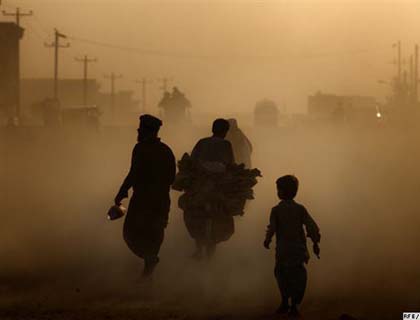The issues pertaining to environmental protection is one of the hottest topics at global levels. If human beings are to live on this planet, they need to work out effective plans for conservation of natural environment and put efforts for greener surrounding. Keeping in view the vitality of better environment for human lives, we need to take the environmental issues as serious as political, social and other issues. This is the only way that is deemed to assist in safeguarding the natural system against destruction. For this every nation is responsible and issues of environment are common for all.
In Afghanistan, like almost everything, the environment too has been the victim of three decades of war. Ancient writings and archaeological evidence show that once rich areas of forest and grassland have been reduced to stretches of barren rock and sand. The government of Afghanistan began to recognize environmental problems in the 1970s with the help of the United Nations and other international agencies. The pressures of the war, however, have diverted attention from these issues and further aggravated the country's environmental state. Forests and wetlands have been depleted by centuries of grazing and farming, practices which have only increased with modern population growth. In Afghanistan, environmental conservation and economic concerns are not at odds; with 80% of the population dependent on herding or farming, the welfare of the environment is critical to the economic welfare of the people. In 2007, the World Health Organization released a report ranking Afghanistan lowest among non-African nations in deaths from environmental hazards.
In the post Taliban Afghanistan some measures have taken by the government for addressing the concerns related to environment. But these measures have not been sufficient and have remained confined to documentation, seminars and workshops while the environment is in need of practical measures.
In the year 2005, Afghanistan National Environment Protection Agency (NEPA) was established and in order to specify the duties, responsibilities and authorities of this organization, environmental law, the first in Afghanistan history, was drafted. Without much delay the law was endorsed by President Hamid Karzai. However, the law could not come into effect even in the following year as the Parliament took much time bringing several amendments in it. The final and approved version of the law was released in the beginning of 2007. The law defines the agency's function as well as its powers. NEPA serves as Afghanistan's environmental policy-making and regulatory institution. Its role is to regulate, coordinate, monitor and enforce environmental laws. The agency is expected to play a major role in environmental protection, as well as to be the central point in dealing with the management of Afghanistan's environment so that it benefits all the citizens of Afghanistan.
In the major of cities of Afghanistan, the environment has been badly harmed. Apart from the major environmental issues today for Afghanistan like soil degradation, air and water pollution, alarming rate of deforestation, overgrazing and desertification, environmental problems in urban areas are becoming increasingly complicated due to lack of attention. Kabul the capital city of Afghanistan, in itself, has turned into an open garbage area. The only difference between a deserted area where waist from cities are transferred and Kabul is that in the later one people live and in the former one life of human is considered to be at great stake. Kabul has fallen in the list of most polluted cities of the world.
Like other countries of the world, in Afghanistan too, this year a week has been dedicated for the protection of environment.The week starts from 5th June and ends on the 11th. The government hopes it will create awareness among the people of Afghanistan to protect their environment. Unfortunately, the campaigning of government about this week is so weak that hardly 5 percent of the population in Afghanistan seems to know about it. The people expect the government to take practical steps regarding protection of environment and not conceal its ineffectiveness by conducting seminars, workshops etc only.
The population of the capital Kabul is estimated to be over five million and is growing at a rapid rate. Kabul was once regarded as Kabul-e-Zeba which means beautiful Kabul and there is no doubt that Kabul is not only beautiful but also one of the historic cities of the world. There are buildings that explain the history of here and also exhibit the impacts of almost three decades of war on this city.
Alas, there is nobody to pay attention to this historic and beautiful city and its problems, a major one of which is pollution and is getting bigger and bigger. The biggest killer in Kabul may not be the Taliban, but the pollution. Kabul is facing numerous problems in regard to pollution: a virtually non-existent sewage and sanitation system, burgeoning slums, crumbling infrastructure and rapid population growth.
And therefore, the government has to act fast and execute a series of projects such as the rehabilitation of forests and promotion of greenery, ban the import and use of substandard fuel, improve waste management and at the same time build and strengthen our own institutional capacity. It is about time the government and the people took steps in order to clean the environment to enable themselves and coming generations breath in a cleaner air and remain safe from various kinds of killing diseases. Not only the municipality of Kabul has to perform its obligations honestly but also the people have to be cautious regarding their surroundings and clean their respective streets on self support basis.

